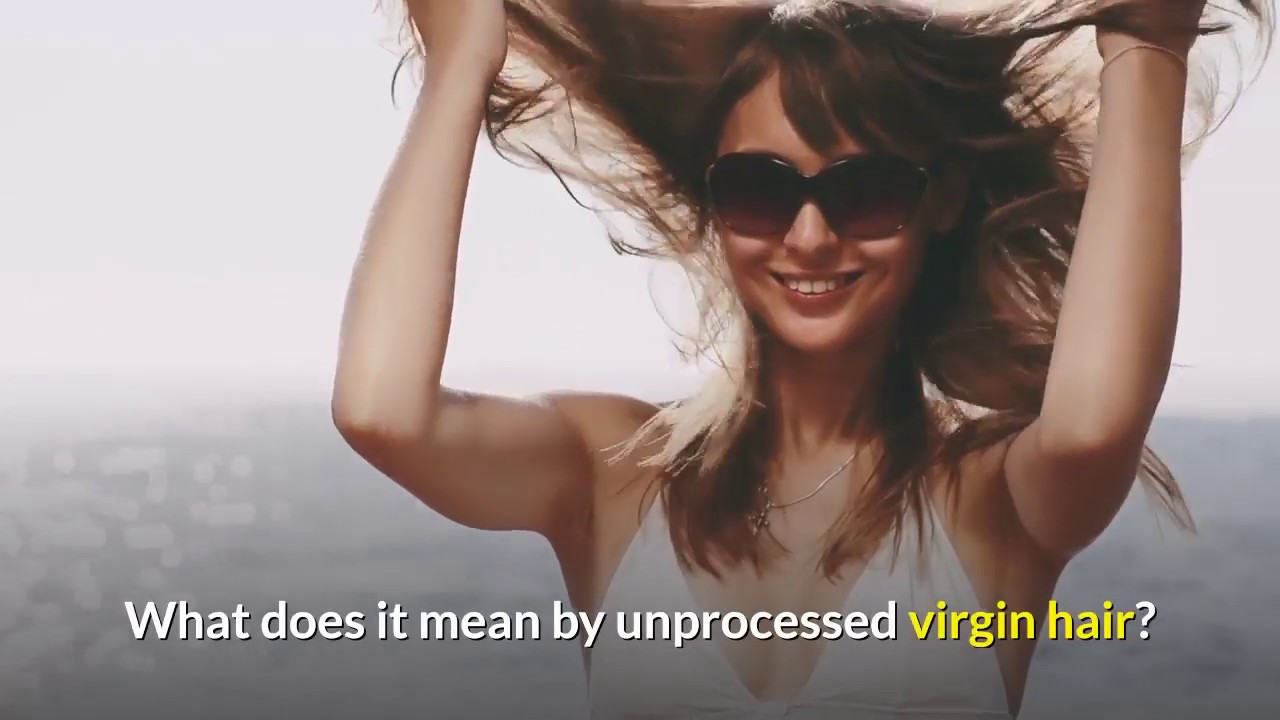Unprocessed hair refers to hair that has not undergone any chemical or mechanical treatments, ensuring its natural integrity and quality. Unlike processed hair, which is often subjected to harsh chemicals, heat styling, or coloring, unprocessed hair retains its original texture, color, and strength. This means that each strand possesses a unique and authentic character, making it highly sought after in the world of hair extensions and wigs. Unprocessed hair offers a plethora of benefits, including its ability to blend seamlessly with your own natural hair, giving you a flawless and undetectable look. Moreover, because it has not been altered or damaged, unprocessed hair tends to have a longer lifespan, allowing you to enjoy its luxurious feel and appearance for an extended period of time. Whether you desire luscious curls, sleek straight locks, or any other desired style, unprocessed hair provides the versatility and flexibility to achieve your desired look effortlessly. By choosing unprocessed hair, you are embracing the beauty of authenticity, emphasizing your individuality, and elevating your personal style. Experience the allure of unprocessed hair and unleash the true potential of your hair game.

What Does Unprocessed Hair Mean?
| Term | Definition |
|---|---|
| Unprocessed Hair | Unprocessed hair refers to hair that has not undergone any chemical treatments or alterations, such as perming, relaxing, or coloring. It is in its natural state and retains its original texture, color, and cuticle alignment. |
| Virgin Hair | Virgin hair is a type of unprocessed hair that has never been chemically treated or styled in any way. It is collected directly from a donor and typically has a uniform texture and color. Virgin hair is highly sought after for its natural appearance and versatility in styling. |
| Remy Hair | Remy hair is a premium quality type of unprocessed hair that has been carefully collected to ensure that the cuticles are aligned in the same direction. This helps prevent tangling and ensures a smooth, natural look. Remy hair is often considered the highest grade of unprocessed hair. |
| Single Donor Hair | Single donor hair refers to unprocessed hair that is sourced from a single individual. This type of hair is highly valued as it retains a consistent texture, color, and quality throughout. Single donor hair is particularly popular among those seeking a seamless, natural look. |
| Non-Remy Hair | Non-Remy hair is a type of unprocessed hair that may have its cuticles facing different directions, resulting in potential tangling and matting. While less expensive compared to Remy hair, it requires more maintenance to keep it looking smooth and tangle-free. |
Unprocessed hair is highly regarded in the hair industry due to its natural qualities and versatility. It provides individuals with the ability to achieve various hairstyles while maintaining a natural appearance. Whether opting for virgin hair, Remy hair, or single donor hair, the choice of unprocessed hair ensures an authentic and premium hair experience.
Title: Unlocking the Mysteries of Unprocessed Virgin Hair
What Does Unprocessed Hair Mean?
Unprocessed hair has become increasingly popular in recent years, but many people are still unsure about what it actually means. In a world where hair extensions and wigs are common, understanding the difference between processed and unprocessed hair is essential. This article will delve into the meaning of unprocessed hair, its characteristics, and why it is highly sought after in the beauty industry.
The Definition of Unprocessed Hair
Unprocessed hair refers to hair that has not undergone any chemical treatments, such as dyeing, perming, or relaxing. It is hair that is in its natural state, as it grows from the scalp. Unprocessed hair retains its natural color, texture, and strength, making it highly desirable for those seeking an authentic and versatile look.
The Characteristics of Unprocessed Hair
Unprocessed hair exhibits several distinct characteristics that set it apart from processed hair:
1. Natural Color: Unprocessed hair retains its original color, which can range from jet black to various shades of brown. This natural color adds to the authenticity and versatility of the hair, allowing individuals to style and customize it to their liking.
2. Textural Consistency: Unprocessed hair maintains its natural texture, whether it is straight, wavy, or curly. This consistency is highly valued as it allows individuals to seamlessly blend their natural hair with the unprocessed extensions or wigs, creating a natural and cohesive look.
3. Strength and Durability: Unprocessed hair is known for its strength and durability. Since it has not undergone any chemical processes, it retains its natural strength, making it less prone to breakage and damage. This durability ensures that unprocessed hair can be styled, washed, and cared for just like natural hair.
The Benefits of Unprocessed Hair
1. Versatility: Unprocessed hair offers endless styling possibilities. It can be curled, straightened, or colored to achieve various looks. The natural texture and color of unprocessed hair allow individuals to experiment with different hairstyles without compromising the overall quality and appearance of the hair.
2. Longevity: Unprocessed hair has a longer lifespan compared to processed hair. With proper care and maintenance, unprocessed hair can last for several years, making it a cost-effective choice for those looking for long-term hair solutions.
3. Natural Look and Feel: Unprocessed hair provides a natural look and feel that is difficult to replicate with processed hair. The absence of chemical treatments ensures that unprocessed hair blends seamlessly with natural hair, creating a realistic and undetectable look.
Caring for Unprocessed Hair
Proper care and maintenance are crucial for preserving the quality and longevity of unprocessed hair. Follow these tips to ensure your unprocessed hair stays healthy and beautiful:
1. Gentle Cleansing: Use a sulfate-free shampoo and conditioner to cleanse and moisturize your unprocessed hair. Avoid harsh chemicals that can strip the hair of its natural oils and cause damage.
2. Moisturizing: Regularly moisturize your unprocessed hair to prevent dryness and breakage. Use natural oils and deep conditioning treatments to keep the hair hydrated and nourished.
3. Styling with Heat: Limit the use of heat styling tools such as flat irons and curling wands to prevent heat damage. When styling with heat, use a heat protectant spray to minimize the potential harm to the hair.
4. Protection at Night: Before going to bed, wrap your unprocessed hair in a silk or satin scarf to prevent friction and tangles. This will help maintain the hair’s integrity and minimize breakage.
In Conclusion
Unprocessed hair is a term used to describe hair that has not undergone any chemical treatments. It retains its natural color, texture, and strength, making it highly sought after in the beauty industry. Unprocessed hair offers versatility, durability, and a natural look and feel. By following proper care and maintenance practices, unprocessed hair can last for several years, providing individuals with a cost-effective and authentic hair solution.

